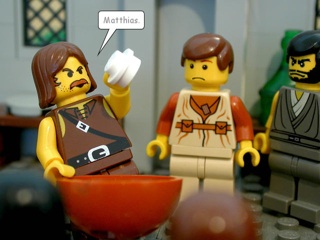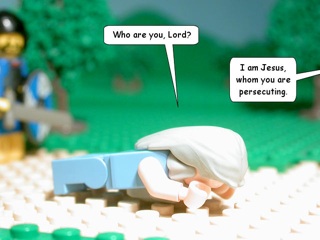 The next prayer we’ll investigate is straightforward enough, but the action the apostles took seems curious to us. Shortly after Jesus “was taken up and disappeared in a cloud” (Acts 1:9, technically called the Ascension), and some time before Pentecost, Peter persuaded the other disciples to replace Judas Iscariot, to return their number to twelve.
The next prayer we’ll investigate is straightforward enough, but the action the apostles took seems curious to us. Shortly after Jesus “was taken up and disappeared in a cloud” (Acts 1:9, technically called the Ascension), and some time before Pentecost, Peter persuaded the other disciples to replace Judas Iscariot, to return their number to twelve.
Peter quoted Psalm 109:8: “Give him a short life, and give his job to somebody else.” He went on to explain that the replacement needed to have been a part of the Jesus Movement from the beginning at Jesus’ baptism, through the years of Jesus’ ministry, to Jesus’ resurrection from the dead and his ascension. The criteria seemed to have narrowed the choices down to two: Joseph Barsabbas, also called Justus, and Matthias. The disciples all apparently agree with Peter on the criteria, because they prayed,
You, O God, know every one of us inside and out. Make plain which of these two men you choose to take the place in this ministry and leadership that Judas threw away in order to go his own way. (Acts 1:24-25)
This prayer reflects their awareness of God’s responses to Moses (which we considered in chapter 3): “All right. Just as you say; this also I will do, for I know you well and you are special to me. I know you by name” (Exodus 33:17) and the call of Jeremiah (see chapter 5): “Before I shaped you in the womb, I knew all about you. Before you saw the light of day, I had holy plans for you” (Jeremiah 1:5).
We see a common theme in Scripture: God knows us better than even we know ourselves. This is the reason we can pray with confidence for God’s help, wisdom, guidance, and courage. God knows whether Justus or Matthias would make a better apostle because God sees inside these two men. He knows their thinking, motives, and character.
I’m not surprised that the apostles prayed for God’s guidance to make such an important decision. In fact, it seems the natural thing to do. What they did next, however, is a little disconcerting to most of us today. The apostles cast lots, which means they probably threw stones or sticks (The Message says they “drew straws”) to find out which man God had chosen.  While we might feel uncomfortable with the idea of throwing dice to discover God’s
While we might feel uncomfortable with the idea of throwing dice to discover God’s
will, this was a common practice in Jesus’ day. Several big decisions in the Old Testament, including choosing Saul to be the first king of Israel (see 1 Samuel 10:16-26), were made by casting lots.
What we don’t find is an explanation for how drawing lots works or how God worked through this practice. While it’s accepted in the Bible, it never states that casting lots is a way for all God-followers in all times to determine God’s will. So it’s done rarely now.
Casting lots aside, the importance of this passage is how the apostles turn to God in prayer for their first big post-Jesus decision. Of course, just a few days earlier they would have been able to ask Jesus this question face-to-face, but without the possibility of a physical meeting, they instinctively go to God for guidance–and he doesn’t disappoint them. He helps the Eleven to fill the vacancy with Matthias, who traditionally is believed to have brought the gospel to Ethiopia.
How does God knowing you “inside and out” affect how you pray? When was the last time you went to God for guidance before a big decision? What happened? Would you feel comfortable casting lots or drawing straws to determine God’s will on an issue? Why or why not?
If you like this and you’d like to read more, check out my book, Ask Seek Knock. Thanks.
Copyright Tony Jones, 2008. Used by permission of NavPress. www.navpress.com
Image courtesy of The Brick Testament

